corridors of studio buildings, tormented with the sounds made by aspiring young musicians. They described the charlatans, the frauds, which she found on every side, teachers who offered every sort of trick and method by which fame and fortune could be reached by the one and only short cut. There were women called Madame Tessitura and Madame Scarlatti, who had been born Smith or Jones and knew less of music than May Seton, and men who wore velveteen jackets and insisted upon being called "Maestro." There were the usual adventures (alarming to Hattie Tolliver who saw her daughter still as a little girl) with lecherous old men. Indeed, in this connection Ellen wrote with a certain hard mockery that was utterly strange and carried overtones of an unmoral point of view, as if such things were to be treated more as preposterous jokes than as "grave offenses." And in this Mrs. Tolliver fancied she discerned some traces of Lily's influence. To a woman like Lily, such things didn't matter. She took them too lightly, as a part of the day's experience . . . carefree, charming, indolent Lily, so impossible to combat.
And at last, wrote Ellen, she had stumbled upon the proper person . . . an old man, a Frenchman, who bore the name of Sanson. He knew what music could be, and so she had settled with him, working under his guidance. In his youth he had known Liszt, and he had been a friend of Teresa Carreño, until a quarrel with that temperamental beauty ended the friendship. Ellen, he had hinted, might one day become as famous as Carreño (she was like her in a way) but she must work, work, work and not lose her head. It would be a long hard path with Paris at the end! (It was always this thought which filled Mrs. Tolliver with a nameless dread. Paris! Paris! And Lily!)
But what troubled her most was the absence of any comment upon Clarence beyond a simple statement that he was well. By now she must have realized that Ellen had no love for him. From her letters it was clear that she had not found him actually offensive. He was a good enough husband; he did everything for Ellen. It was, indeed, clear that he worshiped her. But on her
